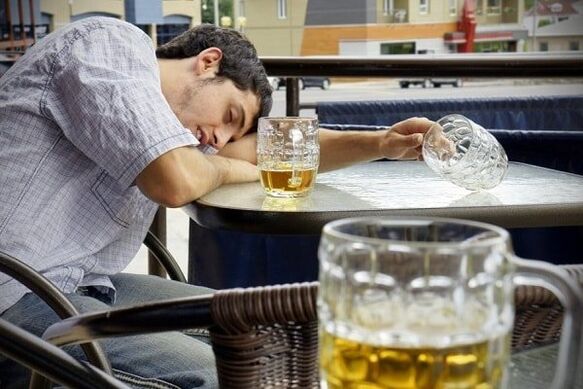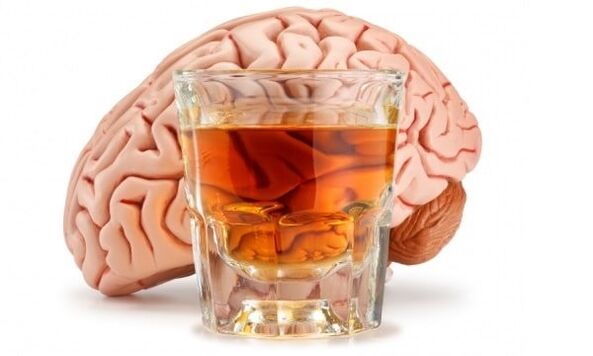Alcohol addiction and the treatment of alcoholism began to be discussed more and more often and persistently. There's a problem. How to help an alcoholic cope with addiction?
This question is asked by more than one family member with a similar problem, most often the wife of an alcoholic, who dreams that one day her husband will stop drinking. How to help an alcoholic stop drinking?
When you want to help a patient with alcoholism, you are most often accompanied by a subjective sense of the problem. You are irritated by alcoholic beverages, which complicate family relationships and contribute to financial hardship.
A person who is addicted to alcohol may have only a vague impression that the issue is out of control and often does not see the problem at all in alcohol abuse.
He does not realize that he has to do something about his alcohol addiction, especially when asked to take drugs. The alcoholic honestly denies that he is.
In the eyes of a drunk person, other people who want to help exaggerate the situation. They are like enemies, not like helpers and allies. What can be done to make helping a drunkard at home effective?

How to help an alcoholic stop drinking?
The paradoxes of the help given to a drinking person.
More than one wife of a drinking man wondered what family life would look like if the husband stopped drinking. In a state of grief and anger, she throws arguments in the style: "If you loved me, you're done with this alcohol for a long time. "Unfortunately, these kinds of words only bring about a result that is fundamentally different from the intended one.
By strengthening the guilt in the home drinker, the result is that the patient wants to drink. The behavior of alcoholics is not a manifestation of his bad will, it is a consequence of the disease.
His emotions, thinking, and willpower began to be driven by alcohol, from which it is difficult to escape. Alcohol becomes a way to stifle sadness, boredom, shame, stress, routine.
The mechanism of addiction is that ethanol extinguishes negative emotions, giving in exchange, at least for a short time, the positive ones - joy, relaxation, peace. When he is sober, despair overwhelms the person again and later another bottle or beer becomes the "medicine".
A person who is addicted to alcohol, under the influence of alcohol, changes bad emotions into pleasant ones, which leads to a complete lack of desire to change something in his life. Therefore, the best help for a drinking person is that which consists in confronting the alcoholic with reality when he is sober.
Let him experience the consequences of his drunkenness, for example, waking up on a park bench without watches or shoes, paying a fine for driving while intoxicated, and receiving a reprimand from his boss for not showing up for workafter an event with colleagues.

Any negative experience of alcohol intoxication will be a signal to the drinker that drinking alcohol is not at all attractive and is a serious problem that creates other difficulties - problems in family relationships or at work.
Unfortunately, many people want to help a loved one by brainstorming how to help an alcoholic cope with addiction and make every effort to silence the issue of alcoholism so that the family does not learn about the problem.
Instead of calling the problem "alcoholism" and allowing the drunk to experience the negative consequences of alcohol abuse, people do something completely different. They protect the drunkard of the house, justify his drinking, hide the alcoholic beverages from him, deny that they have any problem with alcohol.
Thus, the drinking family feels "protected" and can still drink with impunity. Often, people who want to free the alcoholic from the shackles inadvertently become drinkers and contribute to the postponement of the decision to stop drinking.
The most common victims of homosexuality are women alcoholics. If the husband is an alcoholic, then he is addicted to a chemical substance - ethanol, and his wife becomes, surprisingly, addicted to her alcoholic husband.
She becomes a so-called partner who does not trust anyone in the world of the spouse and is constantly desperate preoccupied with finding a new job to pay off her partner's financial obligations. This makes him lie to the children that the father is ill, denies alcoholism, neglects himself and the children, ignores his own needs.
This problem also requires some therapy. How to help an alcoholic cope with addiction? Until the alcoholic's wife realizes that she is not helping him, protecting him from the negative consequences of alcohol intoxication, until then, the husband will drink.
Co-alcoholism is a series of careless behaviors of a partner of an alcohol addict who tries to adapt to a pathological situation. Unfortunately, this only multiplies the subsequent pathologies and problems.

The family then begins to intervene with not one, but two addictions - alcoholism and co-alcoholism. The wife makes every effort in good faith - she hopes that in this way it will make it easier for the husband to get out of the addiction. Unfortunately, her efforts have the opposite effect - she inadvertently provokes the disease even more.
Pays a lot of attention, cares, promises, lies, protects - nothing. How to help an alcoholic cope with addiction? To help an alcoholic stop drinking once and for all, you need to stop pretending, admit that you are powerless, and seek professional help.
Helping an alcoholic is an ungrateful role because the alcohol addict will fight hard for his drinks. Once you have decided to help an alcoholic, it is worth remembering that this is a job for many years, and not for one day.
A person who drinks will not change under the influence of an obstacle, even the most violent. Some argue, on the contrary, that it is impossible in itself to help an alcoholic, because you can only harm yourself. Encourage people to seek help from specialized centers such as addiction therapy centers and others.
Tips to help someone who is addicted to alcohol
How to help not to harm and increase the development of alcoholism?

Here are some tips and tricks to keep in mind when deciding to support and heal a person who drinks:
- Acknowledge that alcoholism is a chronic disease. Do not see it as a shame and disgrace to the family or something that should be hidden in front of the whole world.
- An alcoholic is like a bad kid who should be punished for lack of discipline and disobedience!
- Do not believe the promises of a drunken house when you realize that it is possible to fulfill them! An alcoholic may state his desire for "cosmetic changes", for example, guaranteeing that he will change the type of drinks to the weaker ones. Do not expect drastic changes driven by a quarrel or blackmail.
- Be consistent! If you said you would do something, please do it. Do not worry about leaving when you are not ready.
- No need for reprimands, do not drag yourself into conflicts, do not read sermons, especially when an alcoholic is drunk. He already knows everything you want to inspire. This behavior only provokes further lies and the presentation of baseless promises.
- Do not expect an immediate and quick way out of the problem! Alcoholism is a chronic disease, and even long periods of abstinence do not guarantee that the disease will not return. Prepare monastery tea every day, it effectively relieves alcohol and nicotine addiction.
- Do not control how many alcoholic beverages, do not leave the bottles purchased, but also do not allow open access to alcohol - this will only push the alcoholic into even more desperate attempts to get alcohol and look for an opportunity to drink.
- Never drink together in the hope that he will get less and drink less. How can you help an alcoholic stop drinking if you are sitting and drinking together? No way.
- Do not let the drunkard lie, do not believe his lies and promises, because in this way you allow him to hope that he is able to surpass his loved ones.
- Try to give alcohol support and love. Appreciate his efforts to stay sober. Remember that alcoholism is a disease and you do not need to blame anyone for the disease.
Helping an alcoholic will be more effective if you just leave him alone - do not insist on rehabilitation, do not shout, do not cry, do not beg, do not prepare sick days, do not borrow money, do not clean after his intoxication. holiday, let's try to put things right with a hangover. . .
Let him drink at his own risk and peril. The sooner he reaches the end, the more likely he is to quickly want to give it up in order to start getting better.































